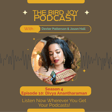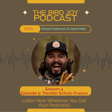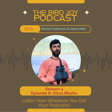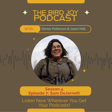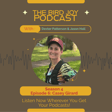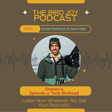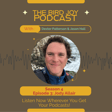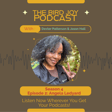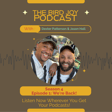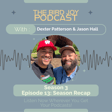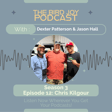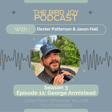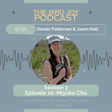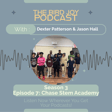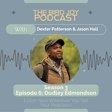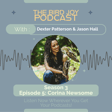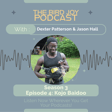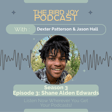Introduction to Bird Joy Podcast
00:00:00
Speaker
You're tuned in to season three of the Bird Joy podcast hosted by Dexter Patterson and Jason Hall. This podcast is for all the homies across the globe, a place to celebrate birds, community, and joy together.
00:00:15
Speaker
We're back with more stories from the birding world, more voices doing dope work in STEM, and more reasons to get outside and enjoy the birds. Are you ready for some bird joy? Let's go.
Guest Introduction: Nicole Jackson
00:00:28
Speaker
We are so excited to welcome today's guest to the Bird Joy podcast, an environmental educator, urban birder, and self-described and diverted nature lover.
00:00:38
Speaker
She's also a proud Cleveland native and graduate of the Ohio State University. She earned her degree in natural resources with a focus on environmental education and interpretation.
00:00:51
Speaker
For over a decade, she's been doing the work, folks, partnering with environmental nonprofits to help communities connect to with nature in more inclusive, meaningful and equitable ways.
00:01:02
Speaker
Nicole was also one of the co-organizers of Black Birders Week and launched Black and National Parks Week to celebrate and highlight black experiences in and on our public lands. She also co-created a course with the Cornell Lab of Ornithology called Let's Go Outside, How to Connect Kids with Birds and Nature, a fantastic resource for families and educators who want to nurture curiosity and confidence in the outdoors.
00:01:27
Speaker
And she's not done yet, folks. After all that, Nicole is working on a documentary film and continues using her voice, creativity, and passion to build stronger connections between people and the natural world.
00:01:39
Speaker
Nicole is a leader, a connector and a joyful force in this space. Nicole Jackson, welcome to the Bird Joy podcast. Thank you. Thank you so much for having me. I'm so excited to be a part of this podcast and so excited to see you both again. We had a brief time at the biggest week, so I'm glad to share more of my experiences in Bird Joy with you all.
Post-Black Birders Week Reflections
00:02:03
Speaker
Yay. Oh, that's so great. And like, how are you doing? Cause this, this is the end of Blackbirders week. yeah It's not just the week, it's the months that lead up to it. yeah And you are one of the folks that are currently, you know, you have your hands on it. You're running stuff, you're scheduling stuff. You were on a ton of the different events that we had virtually during the week. So did you get some rest last night?
00:02:25
Speaker
Are you okay? Yeah. how are you doing? Is your cup full? Like we just like Dexter, where are we getting anything? Dexter and I just want to check on the home and make sure you're doing all right. Yes, I am. I actually did get good sleep. Good enough. um I tend to plan for rest, even though like I'm feeling tired and like, oh, I'm so exhausted, but I'll end up staying up past when I should. i think I went to bed like around 2 a.m., but it wasn't because of Blackbirders Week stuff. it was just because my brain was racing and thinking about transitioning into the next couple of weeks of of things that I have to do.
00:03:01
Speaker
But other than that, like, yeah, last night, um just thinking about the wrap up of the last day of Blackbirders Week was really awesome. And just I did a short park visit, one of our metro parks before I wrapped up the day. actually got a really cool bard owl sighting, which is really fun. So I legit was just like,
00:03:22
Speaker
chill, relax, like we wrapped up, you know, the week, we have so much engagement online and offline and just being able to experience um other black people and their joy with birding and nature connection just keeps me feeling inspired and and full.
00:03:37
Speaker
Well, if no one else has said it yet, Thank you, Nicole, for everything you do for us for Black Birders Week. Yes, so much. It's always incredible. Thank you.
00:03:48
Speaker
I don't think you guys get enough thanks after the amount of work work that goes into that. So yeah, just want say that to start. Yeah. And I just want to thank the the rest of the team. We're all scattered across the US. So there's people in New York, there's people in California, there's people in Georgia, in Texas. So we're all kind of working, you know, very small group of us working on a national, I would say semi international scale of putting all of these things together while still trying to maintain that authenticity around the work that we do. So yeah, I, I,
00:04:20
Speaker
thank the rest of the team and their hard work and staying engaged, also sharing our joy with the work because we're wanting to bird and engage just as much as our supporters. Sure. you Sure. Yeah. and And I, you know, just to pivot it there a little bit, like you are,
00:04:35
Speaker
continuing to to find this joy in the outdoors through the work sometimes, through the result of the work. But take us back a little bit, right? Like what what sparked your love of the outdoors or environmental education for that matter? Because i I don't think you separate the two all the time,
Nature as a Refuge: Nicole's Personal Journey
00:04:50
Speaker
right? I think just being around you, just to say to the people, like you were always looking for, it like even when we were out leisurely at Biggest Week, you were looking for opportunities to help people. to get them on birds, to talk to them, to see how they were doing. And so like what sparked that love of nature and then that additional love of like educating others in nature?
00:05:08
Speaker
Yeah, I think it's part of just how I grew up inner city Cleveland. i have 10 siblings, um seven sisters and three brothers, was raised by a single parent, my mother. And my connection started when I was five or six. And that was Actually, a really challenging traumatic time for me was when I was in foster care and i was with one of my older siblings, my sister, and we were put into a foster care home together. And unfortunately, we experienced abuse while in foster care. So safety, just thinking about safety, when I would be be back with my other siblings, when I would be back with my mom, like
00:05:48
Speaker
us all being together again. um There was just a lot of unknowns and having to adapt to a new place within, you know, a different part of Cleveland, new ah family, new people, like all of these things. But it wasn't like a typical, like, you know, you're you're with, you know, this awesome family that's going to make sure you're taken care of. That was not the case for me, unfortunately, and my sister. So having to be in survival mode at five or six years old, And then trying to just manage, you know, our mental health and well-being while going through that, of because we didn't have helpers, we didn't have allies, we didn't have people that could keep us, you know, safe, because we were part of this system that was already running on fumes.
00:06:32
Speaker
So to have to figure out how I could best take care of myself in those moments. It was going outside in in the backyard and actually not being like part of the abuse was not being able to engage with other people.
00:06:49
Speaker
We actually had neighbors next door that had two twin boys that I can recall, and we couldn't play with them. We couldn't talk to them. And we stayed in the house a lot outside of going to school. So our schools was right up, you know, around the block, like a couple blocks away. um So I do have memories of engaging with kids and some adults, but it was just for school. But outside of that, we rarely...
00:07:18
Speaker
engaged ah socially. So my was just the silence, I guess it was just the silence and that nurturing feeling that nature like seeing green and hearing nature wasn't even birds in particular, because I hadn't even had an interest in birds um at that time. But it was just that feeling of calm and serenity and Needing something to help me manage all of my emotions of feeling scared and confused and anxious and depressed.
00:07:46
Speaker
And all I had was my sister, but I couldn't even explain those feelings to her. So nature was that person for me that I could just... Feel the things, even if it was like urban backyard nature, I could just feel the things. And then I felt like nature was was receiving all of that.
00:08:03
Speaker
And coming back to me as like, you know, yes, thank you for just releasing. But also I'm here to help you as as best ps I can. Like we're doing this together. And that's when I started to develop a relationship, a more intimate relationship with nature, because it started out as a mental health therapy tool for me.
00:08:23
Speaker
Wow. I mean, Nicole, I, well, first of all, thank you for sharing that testimony because there are a lot of people out there that go through trauma and childhood trauma and don't talk about it. And I think for you to be able to get to this point where, where you're able to express what you went through, that takes a lot of courage. That takes a lot of healing too. And I know one thing I always say that I'm a firm believer that nature heals, but What role has that nature when you found out that it was there for you and it was listening to you, what role has that played in your healing and your growth since you found that over the years? It played a major role. They gave me a voice.
00:09:04
Speaker
I felt being in foster care, I felt invisible and it gave me a voice because i could connect with things that I wanted to talk about, which was, you know,
00:09:15
Speaker
how being out in the sun made me feel or listening to the wind or watching, you know, the different animals frolic around, or even um I do have a vivid memory of grape vines that grew in the backyard, just watching the colors like of the the grapes that would grow in the leaf colors, like very vivid memories of just being up close and personal with nature you It gave me a voice. It gave me voice. So I feel like that was my, the biggest thing for me was to just be able to talk about my experiences because I didn't have an identity yet.
00:09:52
Speaker
It was just, you know, I was still really, really young. Just trying to figure out how to not feel scared anymore. And just be able to share my thoughts and feelings, how however they may have appeared, and not feel shame well.
00:10:12
Speaker
I was seeking, i was also seeking um ah the people pleasing. And just... Wasn't quite sure what I was doing wrong, like felt like I was i was at fault, even though it wasn't clear of of what the reason was, but I needed to fix it.
00:10:30
Speaker
So in those moments of I need to make things right, I would just be quiet a lot because I felt like the more I talked to why it was caused problems or.
00:10:40
Speaker
make people think less of me, like, you know, by the things that I said. So like, I just felt more comfortable for me to just be quiet and behind the scenes, which I still have difficulties with now as an adult, but like, it makes more sense why those things, those challenges still linger because of the childhood trauma. I'm more accepting of it now, but I think when it When I was experiencing it at that age, five or six years old, it was I felt so lost and defeated. and it was just hard for me to really just speak out what I was feeling and what I was going through. And sometimes I didn't even know exactly what the emotion was or what the feeling was. it just wasn't comfortable. it wasn't fun.
00:11:20
Speaker
and I would have a lot of conversations internally with nature of just, you know, i hate these feelings. You know, I just want to go home. i want to be with my family. i want to feel normal. Like all these conversations are just like, I just want things to get better. if for a moment that,
00:11:37
Speaker
nature would distract me, I'd be okay. Because it's just like, okay, i don't have to think about what I'm going through and what I'm experiencing in such a negative way. Nature just opened me up to like, okay, yes, this is a very hard situation and it sucks.
00:11:50
Speaker
The sun is out. The leaves are green. That is a word. and just Wow. That's that gratitude of every moment in nature. always tell people birding isn't about the birds. It's about that sunshine. It's about that wind blowing on your face or that water running. And what I think about too, and especially with Black Birders Week just wrapping up. And I always often tell people that was kind of like a spark bird moment for me, like an osprey moment for me, because I was like, wait a minute. we really out here in all these different
Inspiration from Black Birders Week
00:12:20
Speaker
places. And I remember going to some of these traditional spaces when I started trying to figure out my identity and where I wanted to go and how I wanted to show up in the world. And it was like birds. I love them so much, but I was afraid to tell people that I love them. And I would go to these traditional spaces and I did not feel seen. I didn't see people that look like me. I didn't hear see anybody that talked like me or thought about me or went through trauma and different things. And and I've been pretty open about some of the struggles that I've had as a kid with childhood trauma and and mental health and things like that. And I know you have, and I always admire you about that because we have voices and platforms and I always want people to know you're not alone.
00:12:57
Speaker
Um, that there are people out there and there's still joy waiting for you on the other side. And with Black Birders Week, what I started to see, and I started to see all these black and brown people showing up in these spaces, Nicole, and reclaiming their power.
00:13:12
Speaker
yeah like recan Like showing up at these places like, no, you will not keep this from me. No more. Like we're showing up, we out here, this is for us and reclaiming that joy. So I just love hearing and you be able to talk about this because I don't think people realize that when we speak out, we help other people try to find their joy and their path and to healing. So thank you again for just being you. Yeah. Yeah. And this is the the part of my life where ive I just turned 37 and I'm very grateful to have another year of life ah to reflect on.
00:13:45
Speaker
And that part of it, like the joy, like you can you can eventually get to the joy. Cause I felt like when I was younger, that there was never going to be any joy. There was always going to be darkness. And once I realized the importance of realizing how valuable i was because I existed, oh my goodness. Like I fought for myself even more because I
Nature's Therapeutic Impact on Nicole
00:14:10
Speaker
realized that. And like, just knowing, like I still have so much more evolving and growing to do, but like,
00:14:17
Speaker
It was hard, it was hard to to fight those thoughts, those negative thoughts. Because I couldn't, there was, at the time, there was no one I could relate to, like, share and, like, connect with and say, oh, there's other people going through this. So, like, I can talk about it. So, and there was just so much shame shrouded over it. But also, like, the shame part for me was just, like, that was my 24-7. That was my just feeling guilty, feeling shame, feeling awkward.
00:14:51
Speaker
feeling like I had no no purpose. And that's why I got more into the education layer because when I was going to school, that was kind of my secondary place of joy was school and learning and education.
00:15:04
Speaker
And that was kind of like my my shield and my like protector. It was just like, okay, if you know things and learn things, then you won't feel so like strange or odd or awkward because people, ah people talk to people that know things.
00:15:23
Speaker
So that was like my, you know, and it wasn't even necessarily nature at that time. Cause again, it was a therapy thing. So I, I kept that to myself, but I also had this, I always had this thought in the back of my mind that I don't, this is not something I want to keep to myself. I want to share it with other people because I saw how much of an impact it was having on me. So I'm like, oh, I can and can help other people feel this way and not, you know, so lost and closed off.
00:15:50
Speaker
That was just, you know, okay, what can I do with my learning um to get my, to to know more about myself, but also help other people engage with themselves through the things that they love and enjoy. And that was my kind of entry into just nature as a whole as I got older. And then it became more specific things like biology and habitats and ecosystems and how ah those things, you know, as far as human interactions with the natural world have impact on each other. So like.
00:16:22
Speaker
all of the connections in life was just something I was very fascinated with. Because I think about that in terms, like, as it relates to the mutualistic relationships versus symbiotic relationships versus those things that like, oh my gosh, this makes sense to me because this is what's happening with humans.
00:16:42
Speaker
They just don't realize that they're guarding themselves or they're afraid to speak up because they don't feel like they have support and and nature. i feel like those are those things are figured out or they have solutions pretty quickly because they are just surviving um and trying to prolong their life expectancy. But we, as humans, make things so much more complicated. So that's what's just why can't it just be these simple things
00:17:13
Speaker
equation and equations and puzzle pieces that are being put together to to create that fuller picture of what life can be if we just black out all the noise and the distractions and the self-defeating thoughts and in
Identity and Nature Connections
00:17:26
Speaker
conversations with ourselves. So nature fascinated me in that way. And i I don't know if we're going to talk about this, but I want to talk about this because this showed up in The Residence, um the Netflix series, and One of the episodes really stood out to me for that reason. Cordelia, who's played by Uzo Aduba in the Netflix show, The Residence, talks about like why she became ah detective, like her how how she uses her birding background to help solve cases, but also to help better understand people and their kind of dynamics when it comes to communication, when it comes to manipulation or deception or um
00:18:06
Speaker
nurturing and love like all of these different things so like oh my goodness this just that one episode where she's explaining to her nephew because her sister was telling he wanted to go birding with her they went to go look for this bird and it was taking forever and they had were you know sitting having this conversation about why she is the way she is and some of the words he used was just like stubborn not as compromising like he was just saying all these words that his mom used to describe her sister but she sat down with him and like went around the the background story of relationship her relationship with her sister and how she wanted to help her find a missing strawberry sock.
00:18:44
Speaker
And it was interesting in like how she was explaining and sharing the story because it's like she went through the whole like intricate process of like, you know, she was drawing pictures and like, looking for the sock everywhere and very like a detective like, but also she just didn't want to see her sister sad. So she just went through all of this just to make sure, you know, her sister was okay.
00:19:07
Speaker
And then she she ended up finding the sock, but like just the, the purpose. personal elements of that story of just how we show up as people and why we show up in the way we do because like towards the end she said that's that's probably how you know not how everybody operates but that's just how i am that was just her saying that i accept who i am i'm okay with it it doesn't bother me but also just thinking back to like there's a root we We tend to do that, you know, people that are very type A or very, you know, whimsical, and they don't really have a care in the world. And it's just like, you know, you're to this or you're to that.
00:19:43
Speaker
And that just spoke to me because it really took me back to that place of what I was experiencing when I was in foster care and even up through my teenage years of wanting to help.
00:19:53
Speaker
But also, i just do things in a specific way and like really telling myself that it's okay to be who I am the way that I am. That was just a really enlightening, emotional, I actually teared up watching that episode because I'm just like, yes, you that's me. Yeah, you gotta you. You gotta be you.
00:20:13
Speaker
It's very like pragmatic, like logical, logistical, like very planned um type of personality, but it makes sense for for her and how she shows up. But there is still value to that.
00:20:25
Speaker
I'm a very introspective person. i like information. i like details. I like learning about all of the things, but it's helping me connect to people through learning things. I felt like I couldn't actually talk to people beyond what I was interested in. Like there was just never like, I don't, people scare me or I don't know if they're going to try to use me or abuse me or manipulate me. was just like, I'm just going to keep quiet. I'm not going to say too much. And then when I started talking about nature,
00:20:53
Speaker
I felt like a whole different person. i was just like, I could talk about this stuff for hours. So to me, that was just like, I had this whole other kind of underlying personality that I can like, okay, this is what I can use to reconnect with people that I felt like would just disappoint me or end up, you know, I couldn't trust or or things like that. So I'm very grateful for the relationship again that I have with nature because it told helped me be more trusting and open ah to building more
Communication and Community Building
00:21:20
Speaker
and And I want to kind of build on that a little bit, right? Because some of the interactions I've seen you have out in nature with people, and I don't know if I told this story on the podcast before though, but like when you came out here for ah bird walk years ago um and we went to the visitor center and like you just started walking up to every black or brown person you saw and you were like, hey, how's it going?
00:21:41
Speaker
Why are you here? What's going on? What do you like here? Like, what do you love about Valley Forge National Historic Park? Right. And I remember being like, man, she's really out there. Like she's going up to folks. And, but, but you do, you know, on the other side of that, you do describe yourself as an ambivert, right? As someone that can be both an introvert and an extrovert. and i And I wonder how you adapt those communication styles, right? Depending on your setting, because in that moment, right, you're going up to adults and and trying to see what was good with them, right? But I've also seen you interact with kids, right? We've Dexter and I watched you do some of that documentary. And so like how do you how do you judge and how do you shift gears in those situations and and understand when and how to use either your extrovert skills or your introvert skills?
00:22:21
Speaker
I listen and learn. so I'm very out observant. And i think this is useful um that I'm a Gemini because I can- Likewise, let's go. Let's go Gemini. Yes, with the duality of things, I can know go into my introvert mode, but also be in my extroverted mode. So very hummingbird, butterfly type of energy, but also very chill, calm, waterfowl type of energy as well. So I think for me, it's just being observant of- You know, knowing how to read the room. Like i I had to learn those things really early being in foster care of just being more attentive and listening and paying attention to not only what people are saying, but their body language. That's a big part of learning even in, you know, within the national natural sciences fields of education.
00:23:11
Speaker
um and doing field work. Like you have to be watching and observing and be very patient to get ah information, but also not to come to, like not to even come to a conclusion, but to just have more than you started with.
00:23:25
Speaker
So I feel like the more... observant and patient I am which I learned from nature, the more surprises that will happen that I don't expect, but I'm so like, thankful for more of the like serendipitous moments.
00:23:41
Speaker
And those can happen through conversations, those can happen through watching someone else, you know, light up ah through having an experience. And it's just so like, I don't know how to explain it. But like, it's like,
00:23:55
Speaker
a warm, it's beyond a warm and fuzzy feeling. It's so much more than that. So I just like being amongst people that have their own shine. That's what I'm ah attracted to. and that And within that shine that they have, they're being their most authentic self, whether I'm there or not.
00:24:14
Speaker
So I think that's what I'm like, drawn to have like, Oh, my goodness, they're just living their life how they want to without terms or expectations. And I've seen that with kids. I've seen that with adults. I've seen that with seniors. like And to be able to to talk to someone, just talk to them, not even expecting anything of them, but just having a conversation and listening to their experiences and their stories about how they connect and how they enjoy and how they bond, I think gives more
00:24:49
Speaker
of that um connection feeling that
Nature's Role in Resilience
00:24:52
Speaker
lasts long. Like happiness and joy are two very different things. Happiness is a very temporary feeling. It's very fleeting, but joy, it sustains you because I have a lot of those moments where I don't think I would have been able to, nature in so many ways, like figuratively and literally saved my life.
00:25:12
Speaker
When I think about moments where I was just like, I don't i don't think I can make it on this earth. Like those types of thoughts. I don't think I need to be here anymore. Or I don't feel like I have anything to offer.
00:25:26
Speaker
I could go back to those moments where i i hear my laugh, like just my laugh, or think of my siblings smiling or telling me a joke or,
00:25:38
Speaker
um hearing a family member share, you know, a fun memory or even reading a ah book that has a really, you know, cool, inspiring story. Like those things I could go back to and be like, actually you can, you can hang on a little bit longer.
00:25:54
Speaker
you You're going to be okay. That's, that's what I'm doing in those moments of, you know, whether it's through birding or hiking um or connecting people with national parks, I'm, I'm collecting information.
00:26:06
Speaker
those sustainable moments of joy and help me get to the next thing. You know, those sips, yeah those sips from that bird joy cup are powerful.
00:26:19
Speaker
Right. Those sips from the cup of nature are powerful and they do sustain us. And I love that you talked about happiness being fleeting, but joy is something that we can go back to and hold on to. And I'll tell you what, Nicole, you see that in the way that you show up for your community. You see that in a way that you show up for people, whether it's Black Birders Week or you working with kids or or whatever it might be. And it is evident, right? It is so evident in how you operate and how you work with people. And you've worked with so many organizations across Ohio, across the country.
00:26:51
Speaker
What have those grassroots experiences taught you about reaching people in the community and kind of meeting them where they are? I would say... that's That's been exciting, but also um reflective. like I feel like I'm still learning a lot because I do feel like the work that I do is very tied to who I am. So I don't want to just be doing things for the sake of doing things.
00:27:19
Speaker
It's helping me grow and evolve and I want to be able to go back to those experiences and pull any lesson that would be helpful for me or someone else to utilize moving forward. So, and working with different organizations or groups or grassroots organizations, I feel like it's a lot of trial and error, but I'm also just starting with who I am and what I'm interested in and helping other people make the connections like the non-traditional with the traditional.
00:27:50
Speaker
And like helping people bring those things together. Like, Oh, have you thought about this? You might not think these two things go together, but actually, they do. So that's what I'm like, you know, as far as my yeah educational, like environmental educational background, like that's what I feel like I've learned, like my own little secret weapon in the work that I do and not, you know, more of like the formulated stuff that you have to learn from textbooks or, you know, workshops or anything like that. But because of my personal experiences,
00:28:20
Speaker
and my relationship with nature, I can weave more in of that. Actually, we're not doing a ah as good of a job as we think we are with building bridges and making connections with people that are long lasting because this work is lifelong. It's, it shouldn't just be, I mean, it can be for some people and in terms of capitalism and, you know,
00:28:41
Speaker
getting a check. But I think with environmental education and just wanting to inspire people and connect with community and inspire other people to take care of themselves and prioritize themselves in a different way.
00:28:56
Speaker
I think that's where ive found gold. Like I hit, I hit rich. Yeah. And I'm just like, oh, okay, this makes so much sense for me. But it's even more helpful, again, because I took the time to develop my relationship with nature first through therapy.
00:29:16
Speaker
And then like, oh, because it's connecting in this way, I can help other people slow down and really start with the internal. Like, where are you?
00:29:26
Speaker
Who are you? Do you love yourself? Very deep, intimate questions, but also that gets you so far when you really take the time to think about it and put yourself out there in a way to get people to think beyond a job title, beyond a work responsibility, but it is the the whole being that you're engaging
In Her Nature: Empowering Black Women
00:29:49
Speaker
That's healing too, right? That is powerful. That is powerful. That is so powerful. Yeah. And I and i i know you you have a company in her nature, right?
00:30:00
Speaker
Mm-hmm. And is that one of your, you know, describe to people what some of those goals are you have with that company? Because I think that is, from what I've talked to you about, it sounds like it's right in line. And that's that's a place where some of that learning and and community building and introspection for people is going to happen. So, like, tell us about that long-term goal for that.
00:30:22
Speaker
for that particular part of your your your career and your experience. Yeah, it took me a while to get to this part of my life where I felt like I don't think I ever, like there was a time where I was just like, yeah, I'm just gonna work for someone the rest of my life. Like I don't need to like, you know, have my own thing um because I felt like my identity was wrapped up in being told what to do by other people.
00:30:42
Speaker
And then I was just like, actually, that's not me. I think that was a, I think that was a like stress response or like a response to, you know, like this is what I have to do versus this is who I want to be. i'm I'm all about communication. So how are we communicating the things that are important to us? How are we advocating for ourselves?
00:31:03
Speaker
How are we seeking community and the people that will be there for us through the ups and downs and not just, you know, the the toxic positivity moments? Sure. but ah real like you know i'm gonna have this conversation with you about holding yourself accountable or getting resources that you need when you're struggling or even just you know i'm just here to sit with you and don't even have to say anything let's just sit together be in each other's presence and just showing someone that you're there because you love them and you appreciate them and you're willing to go through whatever takes to get them to better place that you're there to be a support. I'm always, now I'm more so always going back to, like full circle moments of, this is what I was trying to say when I was younger. This is like the connections I was trying to make when I was younger, but because of, you know, the stress and like what I was going through, like was just blocking me at every turn. And I'm like, so now that I have that freedom,
00:32:01
Speaker
to just explore because I'm very much an exploration person too. I wanted it to include that and the in the work that I do with my LLC um in Her Nature, specifically for Black women.
00:32:14
Speaker
And this also goes back to my relationship with my mom. So pretty much I would say i'm the only one in my family that has this nature nerd thing. So they grew lot it was like that and yeah like yeah we understand that Nicole is the nature girl. She knows all the things and,
00:32:34
Speaker
I don't think they really understood that I used it as a therapy tool first. I don't think we've had any deep conversations about that, but it was just more of like, because of school and like, you know, you're learning all these things and you know, all this information, you're really smart and intelligent.
00:32:47
Speaker
But I feel like I was using that as a mask to hide from what I was actually going through and feeling that I couldn't really talk to them about because they didn't have the tools to properly help me in in finding the help ah that I should have gotten earlier on in my life. So within her nature, I instantly thought about my mom having to raise 11 children on her own and not having rest, time for rest. Like I don't really remember my mom taking breaks like with no, you don't take breaks, you don't get to live your life. You don't get to put yourself first. And I felt like that's bizarre to me because of the experience those experiences that I had through my nature connections.
00:33:27
Speaker
just like, No, but it's like, I want you to have these moments to mom, like I want you to be able to go to a park and enjoy people watching or watching a sunset or um going kayaking for the first time. Like I want I wanted her to have again, this is me going back to what, know, I don't want to keep these things to myself. I want to share them. And and my mom was the one of the the people that I thought of, like, I want to share those moments with her. I don't want to feel like I'm doing all these things, these fun, new and engaging things. Wow. isolation so that's how i came up with the idea of of in her nature so it was just to help black women really find joy through nature connection find um their identity through nature connection but also help them prioritize themselves outside of you know the hustle and bustle of being a black woman that has to just be doing all the things for everybody else except for them
00:34:20
Speaker
and That was very much a part of it. And then the educational layer. So, you know, teaching things specifically like bird watching or about environmental justice topics. So how, you know, clean air, clean water, like how that impacts Black women as single individuals, married individuals, families, like all of those things, because we don't really get like we don't I don't i can't think of anything where my community, you know, whether it was with my grandmother or my aunt, like where we were actively having those conversations about nature and the environment and how it was impacting us um as far as our mental health and physical, but I felt like it was so important. So it's just like, I want to have these conversations amongst my family and community with people that look like me. And I think they knew that
00:35:05
Speaker
we We always know of the after effects of those things, but we never have the conversations of like, how do we come together and get to a better place to support each other and support community through the learning that is always showcased through ah white perspective.
Black in National Parks Week
00:35:22
Speaker
Yeah. Wow. Nicole, I was crazy. i'm I'm listening to you talk about your mom and how you're saying you want her to experience the park and you want her to go kayaking. And I was like started having all of these emotions running through me because two years ago, and I've talked about this with people, birding got me to my first national park. Right.
00:35:43
Speaker
And it was for our Black Birders Week event. I had never been to a national park. So like that. And it's crazy because when I tell people that story, I'm like, now ask yourself why. Why is it that this person that loves nature and birds and all of these things, why is it that he has never been to a national park? And that gets to the access conversation and so many different things. So talk to me a little bit, because this makes me feel like this is part of maybe the motivation for you to launch Black in National Parks Week. What what inspired you to create that and and how has that evolved for you? Yeah, so Black and National Parks Week started, i created in August of 2020. So this was a few months after the first ah Black Birders Week was launched. And I feel like I'd been thinking about National Park stuff for a while before, even before Black Birders Week. But just... the thinking about um the establishment of the National Park Service, a lot of the stories that we heard in school, whether it's, you know, the different organizations that we learned about, and again, very white.
00:36:44
Speaker
I don't remember too many of Black people being talked about outside of bits and pieces here and there around the Buffalo Soldiers, but never like in depth. sure And they had such a huge role, which is wild. like They gloss over it, but don't realize like they're literally protecting the parks, but we couldn't even go.
00:37:03
Speaker
That was was very much me of like, okay, I'm doing my own research. I'm reading stuff. And I'm like, what and why is this not being a broadcast in the sky somewhere? that like literally like with cloud letters, like,
00:37:21
Speaker
I literally was just like, there's so much information out there that connects to black history. And, you know, the people that we know from our different, you know, regions and neighborhoods that have some role in that history. And even thinking about my college years of Most of my college career was natural resources, but I and i rarely talked about those things. um I had a lot of questions about it.
00:37:44
Speaker
Nobody could really answer them for me or they just would dismiss me. And I'm just like, oh, that just is so it was really annoying to me. But I'm like, OK, I remember that school isn't the only place where you can learn.
00:37:56
Speaker
So I had to like take that and run with it because I'm like, there's libraries, there's people in the community that are literally like historians that have information because of their own lived experiences that I could, you know, have conversations with. um There's experts and scientists and and all of these things. So it's just like, okay, I have to take it upon myself again, trial and error, just figuring things out. And again, wanting to educate myself more. But once I know enough, I want to share it with other people in the community. Essentially, during that time, um I was also part of a national cohort with the National Parks Conservation Association. And it was next gen leaders, I think it was ages 18 30.
00:38:37
Speaker
brought on um as a cohort member. And I signed up for, you know, to be a part of the cohort because Audrey Peterman encouraged me to apply. And I was kind of hesitant because I'm like, oh, this is just going to focus on politics and like the government, which isn't like, I'm fine with to a certain extent, but like,
00:38:55
Speaker
if it doesn't come down to like the community and like, what is the community engaging with? How are they seeing these issues? Then I don't want to be a part of it, but it also helped me step outside of my comfort zone and like still bringing in some of the advocacy layers, you know, with the politics um into the storytelling, which was so much more important to me than the politics was the storytelling. Like are people, black people going to national parks? And if they are,
00:39:21
Speaker
Where are they going? What are their experiences? How does it connect to our history? And is it helping them create a legacy of those experiences for themselves and for their family? That's essentially how i created Black in National Parks Week. Because i'm like I'm I've been to national parks.
00:39:38
Speaker
But again, I was doing this stuff in isolation and I didn't want to just be like, well, it's just me out here figuring this stuff out and learning these things. And it's just like there's so many people starting in Ohio because there is that um connection with history of the establishment of the national parks, because before it was established in 1916, it was um managed under the U.S. s Army, which the Buffalo Soldiers were a part of that management on the West Coast. So the first black superintendent of the national parks was Colonel Charles Young.
00:40:08
Speaker
um He eventually moved huge military background, a lot of accolades, medals and things like that. But his home is actually a national monument site here in Ohio. So there's the history of Ohio, but also out West. And then we think about, again, the layers, like the Homesteading Act and Manifest Destiny, like all of these things I was learning about, but never from a Black perspective. So I'm just like, wow. what are we doing? wow So I was just like, I need to create something because um I don't think anybody else had, you know, and I was kind of nervous. I was like, I don't know if I should do this. It's a lot.
00:40:42
Speaker
But then I was like, well, if nobody else is doing it, then I might as well. I really just wanted to start with everyday black people that were visiting national parks, because I wasn't hearing enough of that again, from family, from friends of just like, yeah, I'm taking a trip because it's national park. I'm going to get hiking or rock climbing or kayaking. i didn't hear any of that stuff. So i'm like, I know people are doing it. I just needed to take the time to find them and share my story first of how I connect and how, you know, I have my passport book and I'm doing the stamps and and all of that stuff. And then more people are like, yeah, I do that too. Like, I'm so excited to share my my story with you. so yeah
00:41:18
Speaker
Awesome. Yeah. And I think about you all the time. i'm at Every time I'm at Valley Forge, pretty much, just because I know that there's a perspective there and it's something that i talk to people about when I'm there. And and we are um you know we have this monument to the soldiers of African descent. Right. And it's and it's something every time I ride my bike through there, I stop there, I bird there.
00:41:38
Speaker
And I always think about like, what must they have thought? being here for that, right? What birds were they listening to? And it's something you and I have talked about too. So kudos to you for starting that because it really was like and it is still, I think to this day, kind of a black box of perspective. And it's going to take people like you and me and Dexter and others that like, you said something a minute ago of like, well, if nobody else is doing it, I guess I'll
Connecting Generations to Nature
00:42:05
Speaker
do it. Which is a lot, that's how we end up here, right?
00:42:08
Speaker
how we end up here right um You know, but it's a good thing. um It's a really good thing. And and I wanted to shift gears a little bit, right? Because this driving force of, if people haven't figured it out yet, um you are an educator, if nothing else, right? You were out there getting with people of all ages to get them connected in tons of different ways. And this course you have with Cornell, let's go outside. Like what what was the spark for that project, right? It looks like it was super fun. Yeah. So I...
00:42:38
Speaker
connected with Cornell Lab um through one of their educators, um Jennifer Fee. She did a program working with kids. And I want to say this was in 2021 is when I started working on the course.
00:42:51
Speaker
um And then it was released in 2022, spring of 2022. But they wanted to co-create something that focused on nature connection um with adults who want to engage with kids, like how to get them engaged in fostering a relationship with nature because most of the stuff on Cornell, the courses, the Bird Academy courses are specific to bird ID and not like heavily nature, just like overall nature focused or conservation focused. So it was an opportunity. And like I don't think I remember how they found out. I feel like most of the time, I don't know how people find out about me because sometimes I'm like, I don't want people to find me. I'm just doing it.
00:43:35
Speaker
and then it just happens ambivert the ambivert how did you find me how did you find me you know what it is right it's word of mouth it's it's somebody that works with you and they're like nicole is fantastic you should reach out to her she's excellent at what she does that that's what it is because i mean obviously yeah i'm
00:44:01
Speaker
I'm very grateful for that. Don't get me wrong. I think for me, just the introvert side, as far as the peopling, that's the part where I'm just like, actually, still need a minute over here. So let me go take a nap, take a walk somewhere, and then I'll come back. I'll get back at you. Yeah, because I feel like a lot of the times it feels like I have to be on.
00:44:25
Speaker
and you know I get that people are excited, and they're like, oh, I found out of about all these things you're doing. And I'm like, it's Yes, that was in the moment. It's not right now. That was in that moment when I had that excitement and like, yeah, i want to do things and get out and connect.
00:44:39
Speaker
And then there's moments where I just want to chill and be quiet and like, you know, I don't want to be on. So that's where it's just like most people are connecting with me in that way when I'm not on. So then I'm like, oh, now i have to like get the energy back.
00:44:51
Speaker
Yeah. to get to, you know, the the creating. So back to the the course. So I think it was for ages seven to 10.
00:45:01
Speaker
Again, adults wanting to build a connection with children. So like it could be a grandparent and a grandchild, it could be a son and um a mom. So those types of relationships where it's like the adult um is learning just as much as the child. And I feel like we had a lot of those conversations when we were doing, you know, because it's an ah what is it asynchronous. So it's you can take it at your own pace.
00:45:25
Speaker
You can include you know some outdoor ah side time elements. It can be virtual. um You can share your stories of of those experiences through um like a chat feature.
00:45:36
Speaker
And it's interesting because for me, a lot of the work that I do now, because I've done so much working with ah youth, you know, after school programs, summer camps, like I was very much invested in that earlier on my career. And then I made a pivot because I'm like, well, adults need this stuff too. Yeah.
00:45:53
Speaker
Adults just are like, I don't have time for that. Or like, that was for when I was younger, you can't have that sense of wonder anymore. And I'm just like, but you also have memories of your childhood that you reference a lot. And like, you you feel like you want to, right, go back to it or have a time where you can just relax and and be playful and be curious. And why can't we? Why? Why? can't we just allow ourselves to do more of that? So I'm like, there's this combination of the youth perspective and the adult perspective, and they're helping each other. They're coming together to help each other, not just be in teacher mode. And that's something I learned too, of of being an environmental educator. You're not going to know everything.
00:46:34
Speaker
It's okay to say, I don't know. yes let me get back to you. you don't have to have an answer for every single thing. Sometimes you're just left with nothing. And like that is its own you know experience and adventure. So I think the the expectation that as an educator, as a teacher, that we just have to be this abundance of information that is just spinning out facts.
00:46:57
Speaker
creates less of those moments to really be immersed with nature and immersed with the relationship of a young person. And then seeing the value in them just because they're young doesn't mean that they don't have a ah ah unique perspective to bring to the conversation or um that they're adding value because um where a lot of the times we're in adult mode.
00:47:20
Speaker
So we just, we want kids to be adults as we're talking to them, but no, they're children. Like they're not going to be thinking in the way that we do as as adults. And I have to remind myself and other educators of that a lot, including talking about our emotions as far as like fear and like anxiety and like, you know, just anxiety.
00:47:39
Speaker
it's it's a relatable thing that you can still talk about as an adult, especially when you know, we we have more of these topics, focused on neurodivergence or autism or Asperger's, like all of these things where it's just like, we're still having trouble communicating and we don't feel seen or heard. So through that medium of like nature time, you can kind of have more of those conversations of like, Oh, this is how I'm really feeling, or this is how I'm
Youth Engagement in Birding
00:48:05
Speaker
experiencing life. And because I have this awesome opportunity to connect with nature, I'm again, able to have a voice in a way that I hadn't before.
00:48:14
Speaker
to really express myself in a different way. I love that. Shout out to you for thinking about the young people, but thinking about the young people. And um speaking of the young people, when we saw you at Biggest Week in American Birding, you were with Young Birders, I believe. the Is it the Ohio Young Birders Club? Yes, Ohio Young Birders Club. And that's your home state. And you're working on a documentary. I don't know if you can talk about it yet, but can you give us a peek into what that's going to be about? Yeah. I was reached out to ah by a few friends ah via email and some texts regarding a project that was happening through partnership with documentary filming company and the Ohio Department of Natural Resources. And they were working on putting together an IMAX documentary that focused on the awesome natural resources, kind of nature spaces, wildlife of Ohio, the state of Ohio. Wow. IMAX joint too. Yeah, like...
00:49:14
Speaker
The focus was like state parks and like different nature activities and and all of these things. So one of the activities that they wanted to highlight was birding. um And they found out about the biggest week in American birding and also wanted to include youth in the filming. So we got to do some on the ground filming sessions ah at McGee Marsh and really just have an experience as as a birder and an environmental educator working with youth that are also interested in birds and birding. And it was a fun experience.
00:49:44
Speaker
Awesome. Yeah, it looked like you were doing some great work there when you were doing it. Y'all was banding birds when we saw you. and i think you had a chestnut-sided warbler that y'all had, like, were banded and i released. That was pretty sweet.
00:49:57
Speaker
yeah There was a lot of cool birds. One of the ah youth um that was part of the filming, she was a volunteer bander with her mom. So they got actually got to retrieve some of the birds, which was really cool.
00:50:11
Speaker
There's a lot of warblers, including a robin that we got to release. So that was really cool to watch up close and personal, seeing but ornithologists in the and the banders talk about you know what they're doing when they catch the birds and monitoring them.
00:50:25
Speaker
So, yeah, it was another shout out to the black swamp bird observatory and the homies over there. yeah Black swamp bird observatory. Yeah. Awesome. Awesome. And i I just, as we get ready to wrap up here, I want to know what is bringing Nicole Bird Joy right now?
00:50:44
Speaker
Like what, or what are you looking forward to that's going to fill up your cup? Right. Cause like we said, you have been one of the most instrumental people to make sure Black Birders Week went off without a hitch and that work is very much appreciated. So how are we getting some Bird Joy back into Nicole right now?
00:51:01
Speaker
I feel like the more I can connect other people to bird watching, that's where my joy is. i don't ever want to consider myself an expert because, again, learning is lifelong. We're not going to know all of the things.
00:51:13
Speaker
ah But if you can just share a little bit of your your passion and joy for what the fullness of life looks like through the natural world, it's so...
00:51:25
Speaker
Magical. So again, to see someone experience birding for the first time, whether they're getting their first pair of binoculars or they're getting up to join a bird walk or they've seen a warbler for the first time or heard it sing for the first time.
00:51:39
Speaker
I'm literally just like, yay Like that's my joy um is seeing other people engage
Joy and Gratitude in Birding
00:51:44
Speaker
and connect. And I kind of am just kind of the conduit of that. Like I'm not really, you know, the person that's needing the the highlights or the amplification. It's just more of like, actually you can,
00:51:55
Speaker
have this piece of joy too and and have you know it to go back to when you're not feeling your best or you know when you're going through a hard time, again, connecting it to mental health and and why it's so beneficial for our mental health, especially in the Black community, because um I feel like those joys are very limited for us.
00:52:13
Speaker
um So to be able to experience nature connection from that perspective, I think gives us so much more life and like helps us want to explore and adventure more.
00:52:27
Speaker
It's so, i don't know, you, you warm my heart. Cause you know, you you shared all these stories about the grief and the trauma you went through. And they always say that giving back and being grateful makes a life worth living. And I see you giving back to people and the fact that you love giving back and that's what brings you bird joy.
Fun and Influences in Birding
00:52:46
Speaker
yeah Keep being you. Thank you. Thank you. All right. Before we get you out of here, right? We we tried this with Karina last week. We got some rapid fire questions, right? So just going to come off the cuff with them and do what you want to do with it. So first one, what's one bird that will always make you stop and smile? The gray cat bird. If you could plan one dream outdoor education program anywhere in the world, where would it be? Brazil.
00:53:13
Speaker
I love it. All right. All right. What is your favorite ah childhood memory of being outside in nature? um One of my childhood homes when I was growing up in Cleveland, um I think I was in middle school and there was a ah rose bush growing outside of our, in the front of our house that was just like, you can tell nobody took care of it. And that was my, my oh, I can do something nice for nature, give back to it as it was giving to me. And I took time to tend to the soil and water and it started to, the roses started to bloom. So that was an exciting time for Be able to experience that and like come out every day and see, you know, if the buds were going to bloom, if the soil was, you know, nice and and wet and like the the sun and all of that stuff, it was getting what it needed. that was me again, like nurturing that relationship I have with nature because it had already given me so much. Love it. What's one nature related book or author that inspire you? I would say one of the people is ah Dr. Drew Lanham.
00:54:18
Speaker
He was the very first person that I got to experience as like an actual like ornithologist conservation biologist person that I could share my bird love with because I went to a conference where he was the keynote and I got to share my bird joy with him. And I didn't even know he was like, you know, this popular person, professor person, I just knew he loved birds too. And I'm like, Oh, he's a black guy. And like, he loves birds. I want to talk to him. And like, we actually sat and had a conversation and I felt really connected because he took the time to talk to me and ask me questions about my bird joy. Sounds like the homie Drew. That's incredible.
Conclusion and Gratitude
00:54:52
Speaker
All right. Last one. In one word, what do you hope the homies or people feel when they go outside to experience nature?
00:55:04
Speaker
That is so so so good. That is so good. Nicole, thank you so much for joining us today. we know you're super busy. So this definitely, definitely means a lot to us. So thank you so much. There's so much value in this conversation. And I know our listeners are going to love this.
00:55:21
Speaker
Yeah, for sure. Thank you much for having me. Yeah, thank you. And make sure you all support Nicole and all the great work she's doing. Black and National Parks Week and her nature. I'm sure you'll continue to be one of the driving forces with Black AF and STEM and Black Birders Week.
00:55:36
Speaker
And literally anything else you're doing, folks, get on board. All right. This person is really special and we need to lift her up and support her. and She needs to go get some rest now because she's been doing the work. Thank you both so much.
00:55:48
Speaker
Thank you all for joining us today on the Bird Joy podcast. We hope you have enjoyed exploring the world of birding, healing and nature with us today. Shout out to the BIPOC flock. You can check out what we got going on at BIPOC birding club dot O R G. And until next time, homies, as usual, shout out to the in color birding club here in Philly and color birding dot O R G. We just dropped some summer stuff. So come out, chill.
00:56:14
Speaker
We'll have a good time. Yes, please share, subscribe and shout out the podcast to all your fellow birders, nature lovers or people that you hope get that love that they deserve outside.
00:56:26
Speaker
Please help us spread a little bird joy. Peace, y'all. This was lovely. See y'all later.

